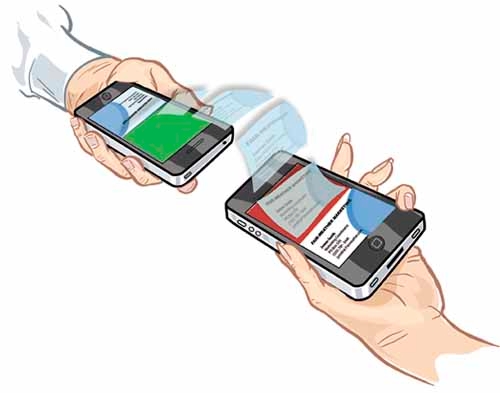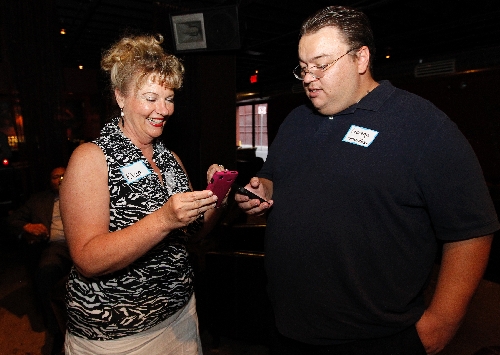Electronic business cards gain cachet, but some aren’t sold
Elta Rahim is an entrepreneur, businesswoman and cheerful chatter. If you buttonholed her at the Las Vegas Entrepreneurs Business Network's recent midweek meeting, she was ready to trade tips, but not paper business cards.
Rahim, whose Eltatude Communication helps other businesses add clients, has joined a trend of people trading data by text. Send a message to a special phone number and include the keyword "Elta," and back comes her electronic card, featuring her cellphone number, email and web addresses.
"When someone asks me if they can have my business card, I say, 'Yeah, pull out your phone.' Then I get the head tweaks," she said, pulling out her phone and cocking her head to mimic confusion. "It's a real talking point."
But even in this mobile digital age, business observers and local printers say the venerable paper business card first seen in 15th century China isn't facing imminent extinction.
NEW WAYS TO LEAVE AN IMPRESSION
IZigg, the text-marketing network Rahim uses to send virtual business cards, is one of a growing number of electronic alternatives to paper business cards. An application called Bump, for example, allows iPhone-to-iPhone information sharing when the gadgets are tapped together. Sites like Hashable.com, About.me and Contxts.com also let users create and trade virtual cards.
Rahim and George Burroughs, the local networking group's founder, had no paper cards at the meeting at the Downtown Cocktail Room in Las Vegas. (Burroughs has them, but said he forgot his.) But everyone else at the meeting had them for the obligatory exchange.
And print shops in the Las Vegas Valley report that orders for traditional cards are as good or better than they've been in recent years.
Fred Adams, an account executive at Las Vegas-based Impact Printing, estimated that business card sales are up about 10 percent, perhaps a sign of an improving economy.
Sales could also appear strong because there's less competition. Kathy Gillespie, managing partner of Las Vegas-based A&B Printing, said as many as 60 local print shops have folded in the recession.
But the paper-versus-virtual conversation stirred spirited debate at the bar earlier this month. Some networkers hadn't heard of or seen virtual cards, but seemed willing to try them, especially after Rahim and Burroughs outlined their advantages.
Because cellphones are now virtually universal, Rahim said, digital cards are as practical as paper and even more flexible -- instantly changeable with a few finger pokes. She said someone with multiple businesses -- not uncommon in a shaky economy in which people try any job that sticks -- can change virtual cards on the fly.
Burroughs, meanwhile, said that because sending texts takes more effort than swapping cards, people who trade virtual data feel more like they're making a connection.
"Another thing about the virtual cards is that you never forget them. I may not have my paper cards, but I have my phone." said Burroughs, president of Creative Marketing of Las Vegas. "And once they're in my phone, I don't lose them."
Robert Richardson, owner of Las Vegas-based marketing and media company Richardson Graphics, also likes virtual cards. At some locally staged conventions, such as the Mashable Social Media Day at New York-New York on March 30, organizers collected conventioneers' contact data by scanning badges, not by collecting paper cards, he said.
Conventioneers, he added, may not even bother exchanging phone numbers.
"A Twitter handle may be enough," he said.
the human touch
But local printers say cards confer cachet, and connection, in a way electrons can't.
"People remember you from something they touch. They remember a hand on the shoulder, or a handshake or a hug, or a kiss on the cheek, depending on your greeting habits," said Robn Meeks, a designing partner for Las Vegas-based Prisma Printing. "Unless you can somehow create a hologram of someone in the air, people are still going to remember tangible things."
And, said Mary Ann Wolf, owner of Las Vegas-based Never Late Printing, if someone wants to remember a card-giver's details, he can jot it easily on the card. Making that note on a mobile phone would mean breaking eye contact while thumbs fly.
"If I'm at a networking meeting and I only have a few minutes I can spend talking to someone," she said, "I'm not going to interrupt the rhythm, the flow, by saying, 'Let me call you on my phone,' or 'Let me send you a text.'"
Meeks said paper cards have a presentational edge, too. There are troves of card styles. They can come in die-cut shapes, geometric and otherwise. And, although cards on paper are the least expensive -- Wolf quotes $12.50 for 100 one-side cards -- someone looking to make a statement can pay $1 or more apiece for cards printed on brushed aluminum, suede, wood or some other medium.
Stever Robbins, author of "The Get It Done Guy's 9 Steps to Work Less and Do More," says cards needn't be expensive to be effective. Paper business cards work fine, he said, if they contain the right information and make the right statement about a company's brand, whether serious, kitschy, edgy or funny. And even in the Digital Age, he said, we still need paper.
KNOWING YOUR AUDIENCE
"We have all of this wonderful social media and it's lulled us into thinking it's easier (than business cards,) but we need both for different reasons," Robbins said. "We want the online access so we can have access to the people we've met online. But we still want the cards because with them all the stuff we need is in one place easily."
Virtual business cards, Robbins noted, may not even save typing. Even if a card includes a link to the giver's Facebook account, he said, the recipient still must log onto the site and submit a friend request to connect there.
University of Nevada, Las Vegas marketing professor Michael LaTour notes that as long as there are different operating systems and phones, paper cards will remain popular.
"The problem so far is substitutability," he said. "Unless we have perfect substitutability of the electronic version for the paper card I think they both need to be there."
LaTour does expect paper cards to fade from use as Millennials, the born-texting generation that entered adulthood around 2000, occupy a larger share of the work force.
Wolf, the printer, said she can see paper cards evolving with the addition of scanner-friendly quick response codes.
But for now, simple cards seem to work fine even for those making a living in digital businesses.
Las Vegas Entrepreneurs Business Network meeting attendee Max Aceituno, who in June launched tripdibs.com, a website that lets customers lock in discounts at local hotels in advance, said he prefers them.
"I had Bump, but not many people had heard of it. I used to joke about it, like, 'Hey, maybe I should Bump you, ha, ha, ha,' " he said. "But I never used it."
And Ryan Jensen, a 21-year-old financial professional for Cambridge Financial Center, said he's one Millennial who respects the power of paper.
"My biggest problem is keeping credibility with older business prospects," he said. "I wouldn't want to confuse them with more tech stuff that they don't have a clue about."
Contact reporter Matthew Crowley at
mcrowley@reviewjournal.com or 702-383-0304.


















